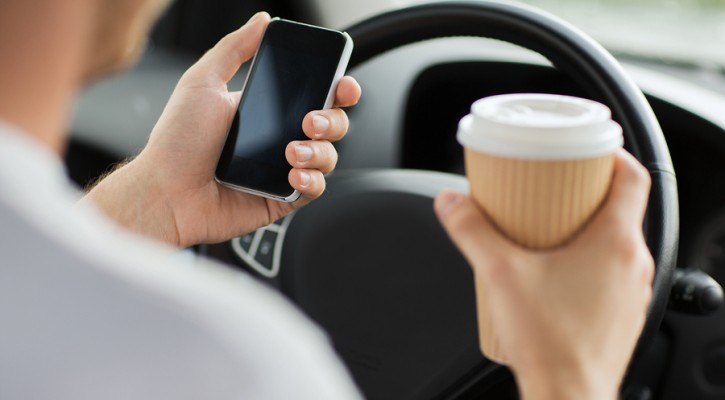How to Stop Texting While Driving? There’s an App for That.
April 8, 2014
Whether you want to control your own bad habit, or you want to ensure that your teen driver isn’t texting behind the wheel, there’s an app for that. In fact, there’s a few.
TXTShield is a password-protected app that shuts down a phone’s ability to text while the car is in motion. The minimum speed that shuts down the app can be set from 10 mph to 40 mph. When texting shuts down, incoming texts do not show up on the home screen and the app automatically sends a response to the person who texted, letting them know that they are driving and will respond later.
Text Limit is another option. This app shuts down the ability to text, call (except 911) and use the internet when the car reaches 30 mph to 60 mph, depending on what the parent or administrator sets as the minimum speed. It also allows control through a website, and sends location updates to the parent/administrator every 5 minutes.
War on Distracted Driving
April 7, 2014
Distracted driving is now such a problem that the Department of Transportation is launching an advertising campaign coupled with law enforcement crackdown to combat the nation wide epidemic.
Radio, TV, and internet ads will run through next week and police across the country will be on the look out for distracted drivers.
The ads will be straightforward, depicting the consequences of driving distracted. The theme is “U drive. U text. U pay”, and internet promoters will be using the hashtag #justdrive. The aim is to get drivers, especially teens, to take a pledge to refrain from texting and driving, as well as give them tools to help raise awareness.
Texting while driving is now illegal in 43 states, and 12 states have banned the use of hand-held cellphones while driving.

Nervous Drivers are Better Drivers?
April 7, 2014
Nervous about your first year as a new driver? Good. This article at Discover Magazine explains that teens who are stressed about being behind the wheel are less likely to crash. See the full story here:
http://blogs.discovermagazine.com/d-brief/2014/04/07/nervous-teen-drivers-are-safer-behind-the-wheel

Worst Drivers in the Country
April 6, 2014
Drivers who cross state lines might notice the learning curve. Some states have crazier drivers, some have more careless drivers, and some have dangerously fast or dangerously slow drivers. Well, this story over at USA Today covers the states with the worst drivers in the nation for 2013:
http://www.usatoday.com/story/news/nation/2013/12/15/worst-drivers-states/4025109/

Roundabouts or 4-Way Stops?
April 6, 2014
Which do you prefer? The roundabout is considered more efficient, and even safer. However, 4-Way stops are the American way. Read this interesting article and join the debate:
http://blog.jafrum.com/2013/10/28/roundabouts-or-4-way-stops-what-is-your-preferred-method/

Distracted Driving Tops Drunken Driving
April 5, 2014
According to the Nevada Highway Patrol, Nevada is now seeing more distracted driving crashes than drunken driving crashes. And, since most people don’t want to admit they are distracted by their cell phones, the already high statistics are actually higher than anyone thinks. See the full story here:

Lessons from the Speedway
April 5, 2014
The Las Vegas Motor Speedway is holding its popular teen driving program: Driver’s Edge. Participating teen get to learn life-saving skills, such as lane change maneuvers, anti-lock braking and skid control.
The program is free, but there are only 15 to 20 openings which usually fill up quickly. Teens must have at least a learners permit. For more information visit www.driversedge.org or call 702-901-7233.

Cameras to Replace Mirrors
April 4, 2014
In the not-so-distant futures, automakers may replace side view mirrors with cameras to completely eliminate blind spots, increase the field of vision, and improve fuel efficiency. See the full story here:

Teaching Teens How to Drive
April 4, 2014
Teaching teens how to drive is one of the most nerve-wracking experiences of parenthood. That’s why teenage drivers should take it easy and drive carefully, while parents should prepare for the challenge by reading this quick list of best-practice tips.
Keep your priorities straight. Drivers education should be at the top of your To Do List. If they are taking classes, then make sure they are always on time and never pull them out early.
Practice often. Teens are advised to drive a certain number of hours by their driver’s education program. Make sure that you two are meeting or exceeding these hours.
Start slow. Begin your lessons in an empty, wide-open parking lot. Make sure they can accelerate, brake, turn, and drive straight. Once you both feel comfortable with these skills, then advance to a low-speed, low-traffic road, and then gradually move towards moderate traffic and higher speeds as skills progress.
Remain calm. Tensions are high and mistakes are costly, however, freaking out and yelling will only make the situation worse. So remember to always remain calm and give “constructive criticism”.
Give good directions. When helping your teen navigate, be sure to know where you are going, communicate effectively with very specific instructions, and always give directions far in advance. Rather than, “Turn right… here!”, tell your teen driver “At the next stop light, take a right”, or “Take the off ramp at exit 243, two miles ahead”.
Point out other driver’s mistakes. This is a great way to criticize bad driving without having to directly criticize your teen driver. You can also point out your own mistakes when you are driving.
Talk about distracted driving. Anything that takes their eyes and mind off the road is distracted driving. Tell them to keep their cell phones out of reach, their vanity mirrors closed, their music pre-tuned and their eyes on the road. You can also have them read this interesting study on distracted driving as it specifically relates to teen drivers.
History of the GM Recall, Continued
April 4, 2014
Recently, GM has faced a lot of questions from lawyers, Congress, crash victims, and the public at large. It turns out that the company has been making grave mistakes for more than a decade, and the fine folks at NPR have put together a comprehensive timeline relating to the GM ignition switch recall that goes all the way back to 2001.
This history is very enlightening, and can help us all get our facts straight on the issue. However, we can expect plenty of more additions to this timeline, including a recent affidavit from a woman who stated that she received a recall letter with the directive to not use a heavy key chain in the ignition. Despite using a single car key, the ignition still malfunctioned, causing the engine to cut off and her driver to manoeuvre the car to a stop without being able to steer. This was after Barra had repeatedly stated that her staff assured her that the vehicles were safe to drive if all extra keys and items were removed from the key chain.
If you or anyone you know is still driving one of GM’s recalled vehicles, be sure to get the vehicle into a dealership for ignition switch replacement ASAP. Do not attempt to drive the vehicle, even with all other keys and key chains removed.
